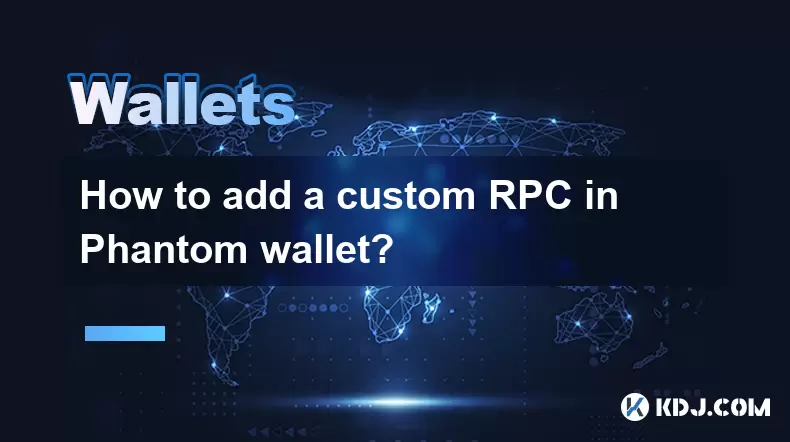-
 bitcoin
bitcoin $87959.907984 USD
1.34% -
 ethereum
ethereum $2920.497338 USD
3.04% -
 tether
tether $0.999775 USD
0.00% -
 xrp
xrp $2.237324 USD
8.12% -
 bnb
bnb $860.243768 USD
0.90% -
 solana
solana $138.089498 USD
5.43% -
 usd-coin
usd-coin $0.999807 USD
0.01% -
 tron
tron $0.272801 USD
-1.53% -
 dogecoin
dogecoin $0.150904 USD
2.96% -
 cardano
cardano $0.421635 USD
1.97% -
 hyperliquid
hyperliquid $32.152445 USD
2.23% -
 bitcoin-cash
bitcoin-cash $533.301069 USD
-1.94% -
 chainlink
chainlink $12.953417 USD
2.68% -
 unus-sed-leo
unus-sed-leo $9.535951 USD
0.73% -
 zcash
zcash $521.483386 USD
-2.87%
Comment ajouter un RPC personnalisé dans le portefeuille fantôme?
Adding a custom RPC in Phantom Wallet lets you connect to specific Solana networks for better performance, testing, or private blockchain access.
Jul 08, 2025 at 03:15 am

Qu'est-ce qu'un RPC et pourquoi ajouter un portefeuille personnalisé dans un portefeuille fantôme?
Le portefeuille fantôme est l'un des portefeuilles de crypto-monnaie les plus utilisés pour interagir avec la blockchain Solana. Bien qu'il soit préconfiguré avec des paramètres réseau standard, les utilisateurs avancés peuvent avoir besoin d' ajouter un serveur RPC (appel de procédure distant) personnalisé à des fins spécifiques. Un serveur RPC permet à votre portefeuille de communiquer avec un réseau de blockchain, permettant des actions telles que l'envoi de transactions ou les soldes de compte de requête.
Les RPC personnalisés sont souvent utilisés lors de la connexion à des TestNets, des réseaux privés ou des nœuds alternatifs qui offrent de meilleures performances ou fiabilité que les fournisseurs par défaut. Comprendre comment configurer cela dans Phantom garantit une plus grande flexibilité et contrôler les interactions de la blockchain.
Accéder aux paramètres du portefeuille fantôme
Pour commencer à ajouter un RPC personnalisé, vous devez d'abord ouvrir l'extension du navigateur fantôme. Cliquez sur l' icône Phantom dans la barre d'outils de votre navigateur pour lancer l'interface du portefeuille. Une fois connecté, localisez l' icône de vitesse dans le coin inférieur gauche - cela ouvre le menu des paramètres .
Dans le panneau Paramètres, accédez à la section avancée . Ici, vous trouverez une bascule étiquetée «Mode développeur». Activez cette option si elle n'est pas déjà active. Le mode développeur débloque des outils de configuration supplémentaires, y compris la possibilité d'ajouter et de gérer des points de terminaison RPC personnalisés.
Localisation de la section de configuration du réseau
Après avoir activé le mode développeur, revenez au tableau de bord du portefeuille principal. Dans la barre de navigation de gauche, faites défiler vers le bas jusqu'à ce que vous voyiez l'option «réseau» dans la section «Solana» . Cliquez sur ceci affichera une liste des réseaux disponibles, tels que MainNet Beta , TestNet et DevNet .
Si vous cherchez à vous connecter à un réseau à l'extérieur de ces valeurs par défaut, vous devrez créer une nouvelle entrée. Au bas de l'écran de sélection du réseau, il devrait y avoir une option intitulée «Ajouter un réseau» ou «RPC personnalisé» en fonction de la version de Phantom que vous utilisez. Sélectionnez ceci pour passer à l'écran de configuration.
Saisir les détails du RPC personnalisés
Lors de la sélection de l'option pour ajouter un RPC personnalisé, un formulaire apparaîtra nécessitant plusieurs entrées:
- Nom du réseau : une étiquette définie par l'utilisateur pour le RPC personnalisé.
- URL RPC : l'adresse de point de terminaison fournie par votre fournisseur de nœuds choisi.
- ID de chaîne (facultatif) : certaines chaînes personnalisées nécessitent un identifiant spécifique.
Assurez-vous que l' URL RPC commence par https:// et pointe vers un serveur RPC compatible SOLANA valide. De nombreux développeurs utilisent des services comme QuickNode , Alchemy ou Infura pour générer des points de terminaison fiables. Si vous configurez un nœud local, assurez-vous qu'il est en cours d'exécution et accessible à partir de votre navigateur.
Une fois que tous les champs sont remplis correctement, cliquez sur Enregistrer ou Ajouter un réseau pour enregistrer la nouvelle connexion. Phantom tentera de vérifier la connectivité avant de finaliser l'ajout.
Passer au nouveau réseau RPC personnalisé
Après avoir réussi à enregistrer votre configuration RPC personnalisée, revenez au menu de sélection du réseau . Vous devriez maintenant voir le réseau nouvellement ajouté répertorié aux côtés des options par défaut. Cliquez dessus pour changer le réseau actif de votre portefeuille.
Il est crucial de confirmer que l'interface du portefeuille reflète le contexte du réseau correct. Vérifiez votre solde et essayez d'effectuer une transaction simple pour vous assurer que tout fonctionne comme prévu. Si vous rencontrez des erreurs, revérifiez le format URL RPC , la connectivité Internet et si le nœud distant est opérationnel.
Le passage entre les réseaux se produit instantanément, mais fait toujours preuve de prudence lors de la transaction dans différents environnements, en particulier lors du déplacement des actifs entre les tissus de test et les plants.
Dépannage des problèmes communs
Parfois, les utilisateurs peuvent rencontrer des problèmes après la configuration d'un RPC personnalisé. Les problèmes courants comprennent des délais d'attente de réseau , des critères de terminaison inaccessibles ou des ID de chaîne incorrects . Pour résoudre ces éléments:
- Vérifiez que l' URL RPC est exacte et ne comprend aucun espace de fuite.
- Testez le serveur RPC indépendamment à l'aide d'outils comme Curl ou Postman pour confirmer sa réactivité.
- Assurez-vous que l' ID de chaîne correspond au réseau auquel vous essayez d'accéder, surtout si vous travaillez avec des chaînes privées ou fourchues.
Si Phantom ne reconnaît pas le réseau malgré une entrée correcte, essayez de redémarrer l'extension du navigateur ou de compenser les données mises en cache dans les paramètres de Phantom. Les problèmes persistants peuvent provenir des configurations de pare-feu ou de proxy bloquant les connexions externes au serveur RPC.
Questions fréquemment posées
Puis-je supprimer un RPC personnalisé du portefeuille fantôme?
Oui, vous pouvez supprimer un RPC personnalisé en naviguant vers les paramètres du réseau et en localisant le réseau personnalisé dans votre liste. Cliquez sur le menu à trois points à côté et sélectionnez Supprimer le réseau . Notez que cette action ne peut pas être annulée sans rentrer les détails de la configuration.
L'ajout d'un RPC personnalisé affecte-t-il la sécurité de mon portefeuille?
L'ajout d'un RPC personnalisé ne compromet pas intrinsèquement la sécurité de votre portefeuille. Cependant, la connexion à des serveurs RPC non fiables ou publiques pourrait exposer vos métadonnées d'activité. Utilisez toujours des fournisseurs réputés ou des nœuds auto-hébergés pour des opérations sensibles.
Est-il possible d'utiliser plusieurs RPC personnalisés simultanément?
Phantom ne permet qu'à un réseau d'être actif à la fois. Bien que vous puissiez configurer et stocker plusieurs entrées RPC personnalisées, vous devez les basculer manuellement via le menu réseau chaque fois que vous souhaitez modifier la connexion active.
Que dois-je faire si mon RPC personnalisé cesse de fonctionner après un certain temps?
Si votre RPC personnalisé devient inaccessible, vérifiez l'état du service ou du nœud que vous utilisez. Les fournisseurs de RPC publics sont parfois en train d'accélérer ou de bloquer les demandes excessives. Pour une fiabilité à long terme, envisagez de vous abonner à un service RPC premium ou d'héberger votre propre nœud Solana.
Clause de non-responsabilité:info@kdj.com
Les informations fournies ne constituent pas des conseils commerciaux. kdj.com n’assume aucune responsabilité pour les investissements effectués sur la base des informations fournies dans cet article. Les crypto-monnaies sont très volatiles et il est fortement recommandé d’investir avec prudence après une recherche approfondie!
Si vous pensez que le contenu utilisé sur ce site Web porte atteinte à vos droits d’auteur, veuillez nous contacter immédiatement (info@kdj.com) et nous le supprimerons dans les plus brefs délais.
-
 RAIN Échangez maintenant
RAIN Échangez maintenant$0.007852
113.00%
-
 PIPPIN Échangez maintenant
PIPPIN Échangez maintenant$0.06097
51.96%
-
 PARTI Échangez maintenant
PARTI Échangez maintenant$0.1396
42.04%
-
 WAVES Échangez maintenant
WAVES Échangez maintenant$0.9141
41.69%
-
 ARC Échangez maintenant
ARC Échangez maintenant$0.04302
35.73%
-
 HONEY Échangez maintenant
HONEY Échangez maintenant$0.01029
21.80%
- La démission de Bitcoin Core suscite des spéculations sur les liens de financement d'Epstein, mais les faits racontent une histoire différente
- 2026-02-06 06:30:01
- Prédiction du prix des pièces Shiba Inu : naviguer entre le battage médiatique et la réalité
- 2026-02-06 07:20:02
- Le fantôme d'Epstein, l'ombre de Satoshi : le récit détourné de Bitcoin occupe le devant de la scène
- 2026-02-06 07:05:01
- La saison Altcoin s'intensifie : la prévente APEMARS apparaît comme un acteur clé dans la ruée vers la cryptographie
- 2026-02-06 07:15:01
- La percée de Bitcoin dans la salle de réunion : remodeler les paiements B2B et les bilans des entreprises
- 2026-02-06 07:15:01
- L'oscillation du Bitcoin frappe durement le MSTR : Michael Saylor fait face à d'importantes pertes non réalisées
- 2026-02-06 07:10:02
Connaissances connexes

Comment générer une nouvelle adresse de réception pour la confidentialité de Bitcoin ?
Jan 28,2026 at 01:00pm
Comprendre Bitcoin Gérer les risques de réutilisation 1. La réutilisation de la même adresse Bitcoin pour plusieurs transactions expose l'historiq...

Comment afficher l'historique des transactions sur Etherscan via le lien du portefeuille ?
Jan 29,2026 at 02:40am
Accéder à l'historique des transactions du portefeuille 1. Accédez au site Web officiel d'Etherscan à l'aide d'un navigateur Web sécur...

Comment restaurer un portefeuille Trezor sur un nouvel appareil ?
Jan 28,2026 at 06:19am
Comprendre le processus de récupération 1. Les appareils Trezor s'appuient sur une graine de récupération de 12 ou 24 mots générée lors de la conf...

Comment déléguer le jalonnement Tezos (XTZ) dans Temple Wallet ?
Jan 28,2026 at 11:00am
Accéder à l'interface de jalonnement 1. Ouvrez l'extension de navigateur ou l'application mobile Temple Wallet et assurez-vous que votre p...

Comment mettre en place un achat récurrent sur un wallet non dépositaire ?
Jan 28,2026 at 03:19pm
Comprendre les limites du portefeuille non dépositaire 1. Les portefeuilles non dépositaires ne stockent pas les clés privées sur des serveurs central...

Comment protéger votre portefeuille contre les logiciels malveillants piratant le presse-papiers ?
Jan 27,2026 at 10:39pm
Comprendre le piratage du presse-papiers dans les portefeuilles de crypto-monnaie 1. Les logiciels malveillants piratant le presse-papiers surveillent...

Comment générer une nouvelle adresse de réception pour la confidentialité de Bitcoin ?
Jan 28,2026 at 01:00pm
Comprendre Bitcoin Gérer les risques de réutilisation 1. La réutilisation de la même adresse Bitcoin pour plusieurs transactions expose l'historiq...

Comment afficher l'historique des transactions sur Etherscan via le lien du portefeuille ?
Jan 29,2026 at 02:40am
Accéder à l'historique des transactions du portefeuille 1. Accédez au site Web officiel d'Etherscan à l'aide d'un navigateur Web sécur...

Comment restaurer un portefeuille Trezor sur un nouvel appareil ?
Jan 28,2026 at 06:19am
Comprendre le processus de récupération 1. Les appareils Trezor s'appuient sur une graine de récupération de 12 ou 24 mots générée lors de la conf...

Comment déléguer le jalonnement Tezos (XTZ) dans Temple Wallet ?
Jan 28,2026 at 11:00am
Accéder à l'interface de jalonnement 1. Ouvrez l'extension de navigateur ou l'application mobile Temple Wallet et assurez-vous que votre p...

Comment mettre en place un achat récurrent sur un wallet non dépositaire ?
Jan 28,2026 at 03:19pm
Comprendre les limites du portefeuille non dépositaire 1. Les portefeuilles non dépositaires ne stockent pas les clés privées sur des serveurs central...

Comment protéger votre portefeuille contre les logiciels malveillants piratant le presse-papiers ?
Jan 27,2026 at 10:39pm
Comprendre le piratage du presse-papiers dans les portefeuilles de crypto-monnaie 1. Les logiciels malveillants piratant le presse-papiers surveillent...
Voir tous les articles










































































